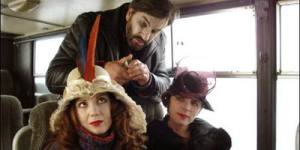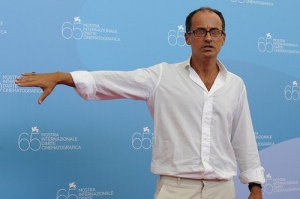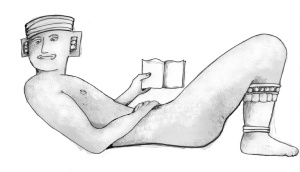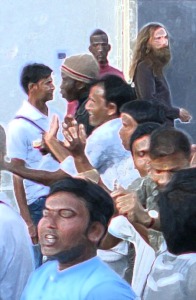Bosnian war is the absurdist setting for The Tour, Markovic
Film review. The Tour (Turneja) is the latest film by the Serbian director Goran Markovic, and it has been selected as Serbia’s candidate for the Oscar Foreign Film category, 2009.
It’s been fifteen years since the war in Bosnia, and no matter how much Serbians and everyone else in the region would like this particular chapter of history to disappear, it keeps popping up, bringing with it the ghosts of suffering and genocide. So, now that Radovan Karadzic is finally going on trial in the Hague, bringing even more shame on the Bosnian Serbs with his antics and resistance, is it really time for a Serbian comedy on the topic? Director Goran Markovic seemed to think so, and he came up with something unique and wise, and at times quite funny.
Turneja, (The Tour) is a very moving and successful film about the comic absurdity of human suffering. Markovic pulls it off by using as his main characters a troupe of clueless actors from Belgrade, so self absorbed and ego-driven that they allow themselves to be transported right to the front lines of the war in Serbian held Bosnia to perform for the troops. They have been lured by the prospect of making some scarce money, but they soon find that they are paid in insults, injury and fearsome misadventure. But in spite of the horror, they are troupers and they will survive. The absurdist theater of war turns out to be a fitting place for these over-the-top thespians, and they manage to bring poetry to the Serbian fighters, and then to the Croatians and Muslims, as well, when they find themselves bumbling about, criss-crossing the battle lines. This is not to say that they learn anything from this experience, or that the fighters have been instilled with the civilizing effects of high culture in any way. The fact is, that no one learns anything in this film, because there is nothing to be learned from the repulsive murderous dysfunction of that conflict. And that is, perhaps, Markovic’s point.
Goran Markovic is an experienced filmmaker whose work has been well-known but perhaps not so well-received critically over the years. With this film, however, he seems to have found his stride. He has found the perfect stand-in for the Serbian people in the street: the self indulgent but good hearted actors who suddenly find that while they had been busy emoting their bogus lines to the rafters the whole world outside their theater had gone mad. Markovic knows actors, he is the son of two of them, and he has spent his life in the world of theater and film. He makes these characters speak with great humanity, even as they are lying, preening and elbowing each other out of the frame. What they recite is perhaps not as important as the life that they breathe into their words. They are in contrast to the nationalist writer who has come to the front to sing the praises of Serbian revenge and terror. Whereas their words bring them freedom and gets the guns momentarily quiet, the writer’s words bring him food and privilege and sends people to their deaths.
The battlefields are the main theater of this story, but this reality is framed by the broken, empty theater in Belgrade where the film begins and ends. It is also an apt metaphor for the state of Serbian culture itself at the end of those years of conflict: terribly wounded, but still full of life and aching to rebuild.
Pappi Corsicato’s Il Seme della Discordia. Discord Indeed.
I wanted to like the film, I really did. All the hype about the Neapolitan Almodovar was enticing, and the look, décor and colors of the preview clips were very promising. And who could resist a director named Pappi? But I knew something was wrong when the lead actress, Caterina Murino started talking at the meet and greet before the viewing. She was sitting right next to the director, and still she had the nerve to say, (I’m paraphrasing):
“It was really difficult at first to work with Pappi, but then we got a working relationship and ended up loving each other. It was impossible to play the roles as Pappi wanted. All of these actors all of them with lots of experience, were asked to act in ways that they had never acted before. When I saw the final product, after Pappi’s editing, it was not the film that I had acted in, so radically had he changed it. No more questions, please, let’s watch the film. Then if you still have questions, I’m sure Pappi will be glad to answer them.”

Nominated at Venice for the Golden Lion. They wanted to like the film too.
She was like her last name: murino, like a wall.
The basic problem with the script is that one crucial element in the story is a rape. There is no way to make a rape humorous. Pappi did his best to minimize it by never actually mentioning the fact. That helped, but it remained the 800 pound gorilla in the room whenever the story took a humorous turn. There were ways to write the rape out of the story, perhaps amnesia or mistaken identities. I have it all figured out. Pappi, please consult me before signing off on any more problematic scripts.
There was also an emphasis on the wrong characters. We see way too much of her mother, and not enough of the flirty salesgirl and the gayboys at the café bar. They are the lighthearted (and lightheaded) characters that could make the comedy soar. It would also be more interesting to see more of the husband, and to get more involved in his problematic position. However, it’s not too late: these characters can all be developed in other scripts.
Il seme della discordia. Hmmm, I wonder what exactly was this seed of discord. Was it the baby, the situation, the actress, the director or just the script?
Alas, things could be much, much, much better. Corsicato is a really fine director with a great sense of comic timing and the subtleties of la commedia all’italiana. Recently he delighted his fans with a short film, made under the sponsorship of the Garofalo pasta company, and distributed exclusively on the web. Questione di gusti, or A Question of Taste is a remake of a sketch from a Dino Risi film from 1971 “Noi donne siamo fatte così.” It is a satire on the fetishes and manias of the nouveau riche, as they try to present themselves as wildly uninhibited. The couple brags about their sexual exploits to the whole company of guests at their party, then have it out with screams and pistol shots as soon as the guests are out the door. Without subtitles, the visuals are a pleasure in themselves:
What’s a man without a mustache? In need of some patchwork. A film review
What’s a Man Without a Mustache, Croatia, 2006.
A comedy written and directed by Hrvoje Hribar. It was one of the highest grossing films in Croatia last year, but forget about the mustache, does it have legs, is a more important question. Unfortunately, international audiences may not be as willing to overlook the bald patches. A mustache is what separates two brothers in this film (both played by Leon Lucev), and it serves to symbolize the various definitions of macho. It is a film about men, how they deal with their role in society.
-
Archives
- July 2015 (1)
- June 2015 (1)
- November 2014 (1)
- July 2014 (1)
- June 2014 (4)
- September 2012 (1)
- August 2012 (1)
- March 2012 (3)
- February 2012 (3)
- October 2011 (1)
- September 2011 (5)
- August 2011 (3)
-
Categories
-
RSS
Entries RSS
Comments RSS






